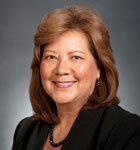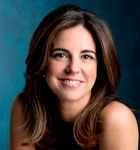Peru was always very neighborly. Between relatives and friends, it was [truly] a communal environment. There was always something going on, someone outside having a soccer game going. When I came to America, it was another world. In Peru, I was used to shopping with my mom in an open-air market, waiting in line 20 hours for milk because the truck wouldn’t be there again for a while. To walk into a supermarket in the United States and see milk and meat everywhere, and no flies—it was crazy.
I was very influenced by my parents’ work ethic. When I was 14, my dad would come home from working at Volkswagen, have a sandwich, and then go clean offices at night. When I got older, I would go with him and clean toilets and vacuum the carpets. You can’t be afraid to work. I’ll never forget: There was a new Chinese restaurant opening, and I walked by around 1 a.m. and saw workers laying brick by floodlight. When I went back later, they were the same people serving inside the restaurant. Things are attainable here if you work hard.
I was drawn to the limousine industry because of the pace. My old boss said to me, “Imagine dispatching as a game of chess, and right as you have your strategy set, someone moves your pieces.” I said, “That sounds fun.” I would take home maps, blank out the towns, and fill them in. I was working 16 hours a day, seven days a week. I loved the adrenaline. It was exhausting, but rewarding.
When I started at 19 years old, I was the youngest dispatcher. Over the years, I moved up. One day the company I worked for was discussing its goals to start doing about $5 million in sales per year. I’ve always been a business junkie, so I blurted out, “Why don’t we shoot for $10 million?” Everyone thought it was ridiculous at the time, but over the next few years we actually surpassed that. The owner, David Seelinger, was a very forward-thinking guy, and he wanted to start incorporating computers into the business. They started sending me out on exploratory trips to Chicago, Los Angles, Florida—which was a big deal, especially when you’re Hispanic, because you don’t grow up around that kind of stuff. My father never had to take business trips or anything like that.
We used to do everything on paper. The efficiency computers brought to dispatching was tremendous. Before that, you depended on one guy, your head dispatcher, to know where all the drivers were. Now you have a program that goes into Google Maps and says: Here’s the distance from the driver to the destination, and there’s traffic. Before, you just had to know those patterns and think, “Okay, it’s Friday. It’s five o’clock. The trip that’s normally 30 minutes is going to take 45 today.” That was all in a person’s head.
I’ll never forget starting World Ground. Unluckily for me, it was after the first weekend they had announced Lehman Brothers was going under. It was the wrong time to start a limousine company. One of the biggest providers of work in this area are financial companies. But it took off. We’re looking at a huge leap in sales next year. And we’re working with clients like Sean John, Simon Cowell, Paula Abdul, British Petroleum, and Valerie Wilson Travel, among others.
It’s about handling variables. You have to deal with traffic, weather, drivers—much of which you can’t control. You have to figure out solutions to all of these things on the fly. It’s about adaptability. I read biographies of business people in my spare time. You won’t read about someone who’s successful who gave up on the first try. And believe me, there will be a first try.

